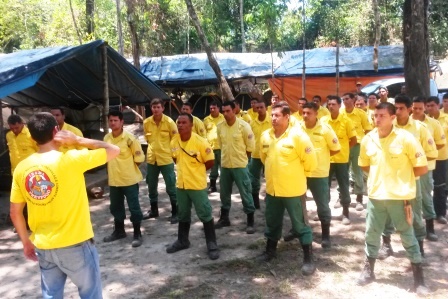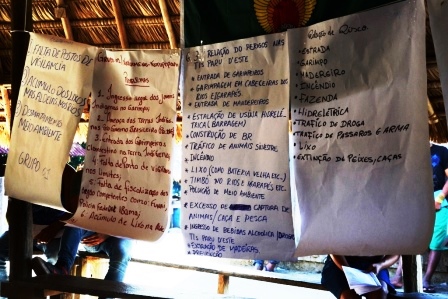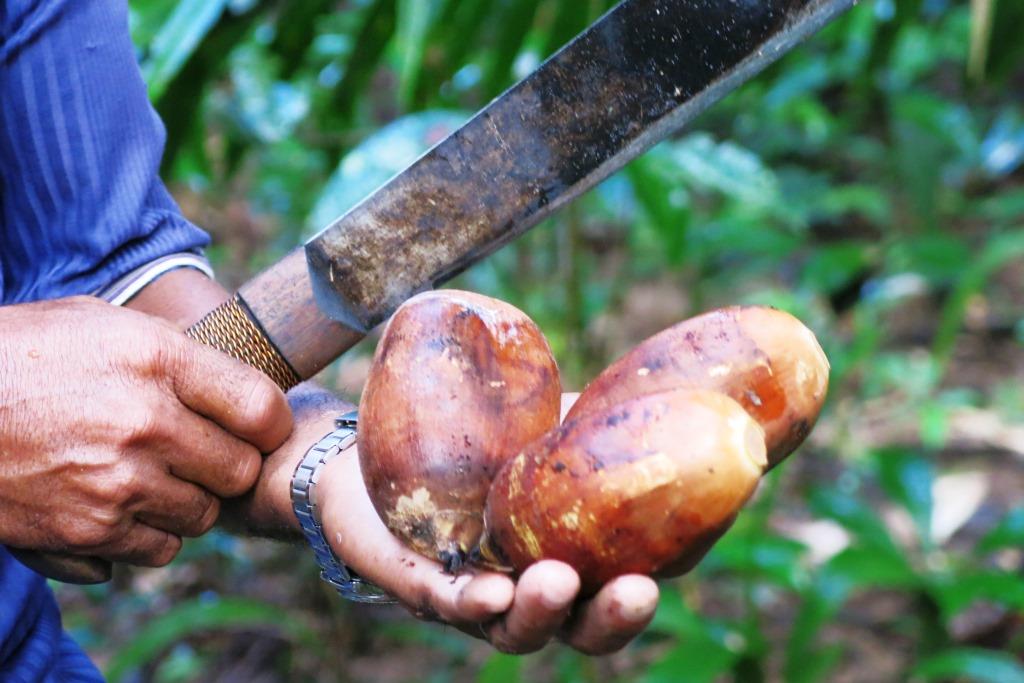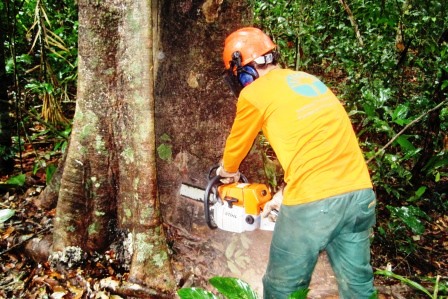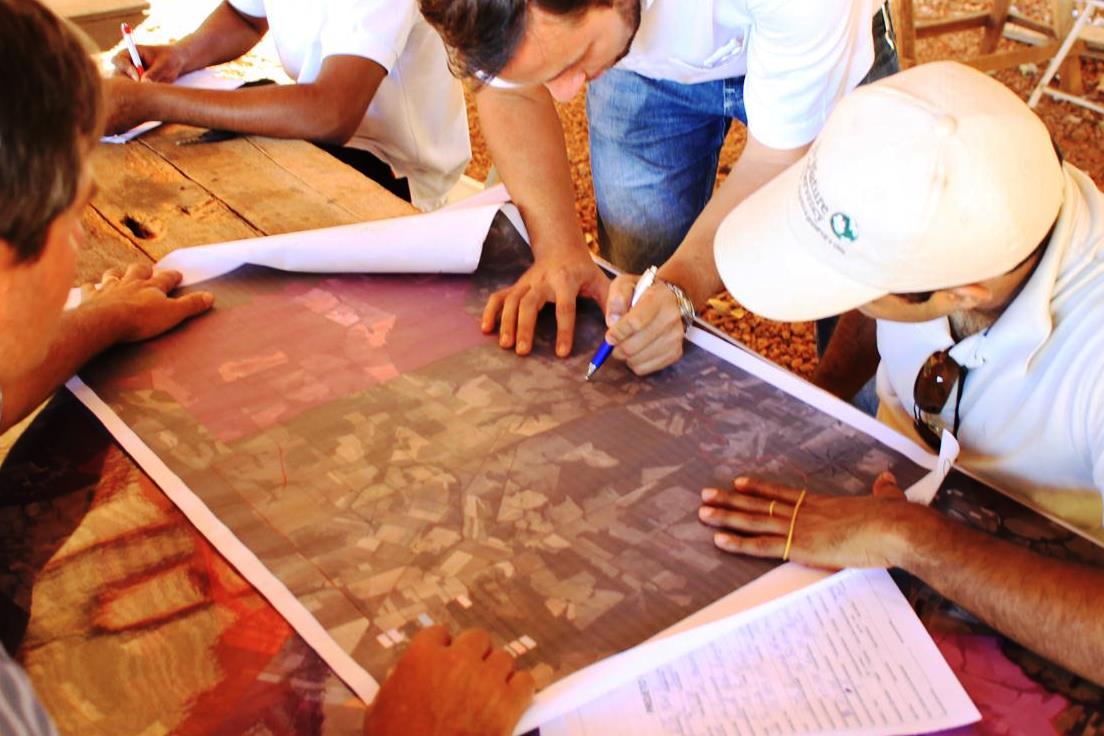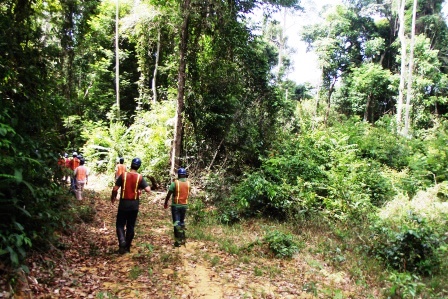INSTITUTIONAL AND ADMINISTRATIVE ASPECTS
Promoting and adopting management measures, associated with entering into fishing agreements in order to reduce the damage to water ecosystems and assure an economically sustainable alternative to deforestation, depend on the success of the integrated action of public agencies of the various spheres of government, on the mobilization of civil society, and on the private sector’s interest. Thus, WWF-Brasil conducted the implementation of the Sustainable Fishing project through an inter-institutional arrangement with actors such as: (i) the Brazilian Institute of Environment and Renewable Natural Resources (Ibama) and the National Indian Foundation (Funai), representing the Federal Government; (ii) the Acre Environment Institute (Imac), the Secretariat of Agroforestry Extension and Family Production (Seaprof) and the Environmental Military Police Battalion (PM Ambiental/Acre) as representatives of the Government of Acre; (iii) the Federal University of Minas Gerais (UFMG), the University of São Paulo (USP), Federal University of Acre (Ufac) and the Federal Center for Technological Education of Minas Gerais, representing technology centers; and (iv) the Colpaf association and Kaxinawá (Huni Kuin) people's organizations, representing civil society. In the scope of the project, conversations were also held with representatives of the private sector in order to elaborate a diagnosis of the pirarucu chain.
The project also counted on a WWF’s team, responsible for the executive and operational coordination of all actions developed, so that the administrative arrangement provided the execution of interdependent actions executed with the partner institutions in an articulated and integrated way.
RESULT AND IMPACT INDICATORS
The project activities contributed to the results related to the "sustainable production" component (1) of the Amazon Fund’s Logical Framework.
Sustainable Production Component (1)
Outcome 1.1: Pirarucu management implemented.
Outcome 1.2: Pirarucu production chain managed with value-added expansion.
The main indicators agreed to monitor these effects were:
- Number of fishing agreements approved collectively and submitted to the competent body (effectiveness indicator):
Target: 15. Result achieved: 19 agreements
Of the 19 fishing agreements approved collectively and submitted to the competent body, seven have been regulated. WWF-Brasil reported to have kept working on the mobilization fronts of TIs’ indigenous leaders and FUNAI’s managers to jointly reinforce the negotiations with Ibama for regulation of other agreements submitted to the body in 2016.
- Number of individuals directly benefited by the activities supported by the project (effectiveness indicator)
Target: 920 individuals. Result achieved: 1,627 individuals
The project activities directly benefited 1,627 individuals, including riverside and indigenous people.
- Number of community organizations strengthened (effectiveness indicator)
Target: three organizations. Result achieved: three organizations
The project supported the strengthening of the following: Colpaf association; Aspakno, indigenous organization representing the Kaxinawá people of the Nova Olinda TI; and Askapa, an indigenous organization representing ten Kaxinawá villages of the Carapanã TI.
- Revenue obtained from the economic activity of sustainable use supported by the project (effectiveness indicator)
Target: 30% increase in revenues obtained from commercialization of the pirarucu managed with sustainability
Result achieved: reduction of 7.6% of the total revenue obtained with the commercialization of the pirarucu managed with sustainability
Of the 19 pirarucu sustainable management agreements elaborated, seven have been regulated for the municipality of Feijó. Thus, regarding the revenue indicator, only the fishing and trading data collected within the scope of the seven agreements already regulated in this municipality, between 2014 and 2016, have been computed.
This contraction in sales was due to the absolute reduction in the volume of pirarucu caught, as a result of the implementation of fishing agreements aimed to protect water ecosystems. This decrease occurred because fishing quotas authorized by the environmental agency were smaller, exactly to avoid fishing to become a predatory short-term activity, but rather a long-term sustainable activity.
In the definition of fishing quotas for monitored lakes, the environmental agency takes into account the population data of the species, from periodic counts. In the Sustainable Fishing project, the measurement of the indicator considered the period from 2014 to 2016, since that in 2017 there was no authorized fishing.
However, it is worth noting that there was a 24% increase in the average income of each fisherman involved in fishing, which increased from R$ 650.00/year in 2013 to R$ 802.87/year in 2016, due to the greater fishing productivity.
- Number of lakes under management with certification criteria implanted (product indicator)
Target: ten lakes. Result achieved: ten lakes
One of the project outcomes expected was the development of a standard for managed pirarucu certification, which has been achieved. With the endorsement and technical support of the Marine Stewardship Council (MSC), an international certifier of marine fishing activity, a Fishing Improvement Program (FIP) was developed within the scope of the project, with actions to comply with 27 certification requirements for achievement of the MSC seal to the pirarucu sustainable management. The project advanced in the implementation of 24 of these requirements in the management practiced in ten lakes, which allowed the resolution of several relevant issues.
Finally, it is worth mentioning that a study on ecological and economic viability and the potential for expansion of pirarucu management practices and production chain have been developed in order to guide the design of actions necessary for the expansion of pirarucu management practices and the strengthening of its production chain.
RISKS AND LESSONS LEARNED
In general terms, it can be said that the Sustainable Fishing project was properly developed, reaching the objective of adopting management measures and entering into fishing agreements to reduce the damage to water ecosystems in the state of Acre. However, in order to guarantee the effectiveness of the project and for chain consolidation, adopting public policies, legislation and regulations that value and encourage the activity is fundamental. For example, payment for the environmental services offered, legal certainty regarding the maintenance of unemployment insurance for artisanal fishermen ("closed season insurance") and the performance of educational and inspection actions by government bodies would make the activity more attractive to the traditional populations, reducing the resistance of many fishermen. However, the State's actions regarding these issues have proved to be insufficient due to the discontinuity of governments and to budgetary constraints.
Another issue that hinders the dissemination of pirarucu sustainable management and discourages many actors is the fact that the first years of the chain consolidation process involved costs for carrying out core activities and investments in infrastructure that were much higher than the total revenue generated. Incremental actions that would add value to the chain's products, such as obtaining sanitary inspection and certification seals, adopting technical innovations and developing byproducts, also require a high investment of money and time.
In addition, due to the pirarucu characteristics, a fairly long interval is required to replenish stocks in order to achieve higher fishing levels with the competent environmental agencies, which could provide more attractive financial returns.
It is worth mentioning that the change in the center of operation management of the project from Brasilia to Rio Branco (AC) brought the project coordination closer to the central activities, since it began to participate physically in a greater number of sensitive actions. Therefore, the link between the entity and the actors involved was improved, facilitating the communication and dialogue within the project, which, in turn, enabled a more incisive action in the management of conflicts and, thus, greater speed in the decisions and execution of activities.
It should be emphasized that the knowledge generated referring to the theme, systematized and shared through the project, can greatly help the definition and implementation of new initiatives aimed to adopt management measures and to enter into fishing agreements.
SUSTAINABILITY OF RESULTS
The sustainability of the results obtained depends on the maintenance of the riverside and indigenous populations’ awareness and mobilization regarding the pirarucu sustainable production theme, and on the continuity of local community’s and institutions’ efforts, including government agencies. It is central to the effectiveness of initiatives such as the Sustainable Fishing project to keep alive the interest in preserving water ecosystems under fishing agreements in the population that has fishing in the Amazon a means of survival and which is constantly in competition with predatory fishing.
Maintaining the target communities’ adherence to new fishing agreements is as important as the adoption of such agreements. As already mentioned, incisive governmental actions are paramount for this purpose.


